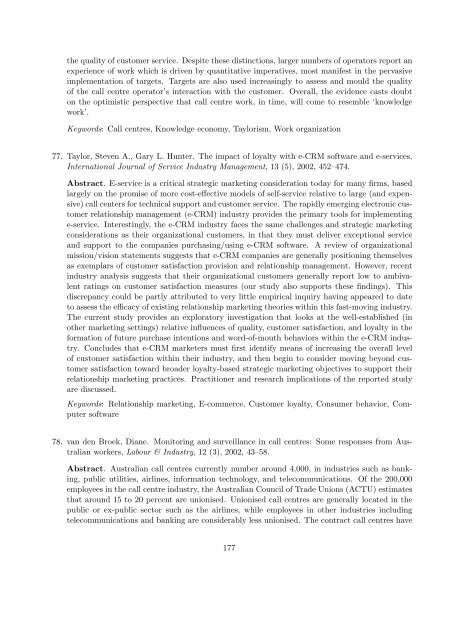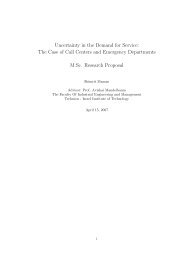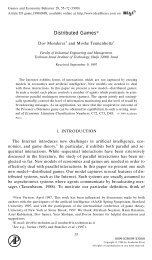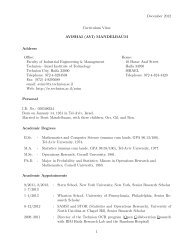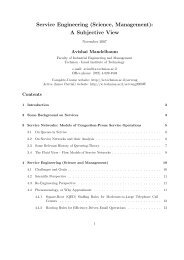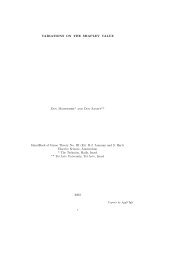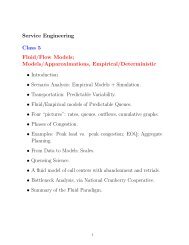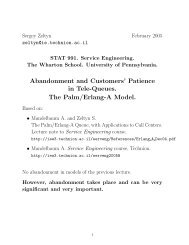CALL CENTERS (CENTRES) - Faculty of Industrial Engineering and ...
CALL CENTERS (CENTRES) - Faculty of Industrial Engineering and ...
CALL CENTERS (CENTRES) - Faculty of Industrial Engineering and ...
You also want an ePaper? Increase the reach of your titles
YUMPU automatically turns print PDFs into web optimized ePapers that Google loves.
the quality <strong>of</strong> customer service. Despite these distinctions, larger numbers <strong>of</strong> operators report an<br />
experience <strong>of</strong> work which is driven by quantitative imperatives, most manifest in the pervasive<br />
implementation <strong>of</strong> targets. Targets are also used increasingly to assess <strong>and</strong> mould the quality<br />
<strong>of</strong> the call centre operator’s interaction with the customer. Overall, the evidence casts doubt<br />
on the optimistic perspective that call centre work, in time, will come to resemble ‘knowledge<br />
work’.<br />
Keywords: Call centres, Knowledge economy, Taylorism, Work organization<br />
77. Taylor, Steven A., Gary L. Hunter. The impact <strong>of</strong> loyalty with e-CRM s<strong>of</strong>tware <strong>and</strong> e-services,<br />
International Journal <strong>of</strong> Service Industry Management, 13 (5), 2002, 452–474.<br />
Abstract. E-service is a critical strategic marketing consideration today for many firms, based<br />
largely on the promise <strong>of</strong> more cost-effective models <strong>of</strong> self-service relative to large (<strong>and</strong> expensive)<br />
call centers for technical support <strong>and</strong> customer service. The rapidly emerging electronic customer<br />
relationship management (e-CRM) industry provides the primary tools for implementing<br />
e-service. Interestingly, the e-CRM industry faces the same challenges <strong>and</strong> strategic marketing<br />
considerations as their organizational customers, in that they must deliver exceptional service<br />
<strong>and</strong> support to the companies purchasing/using e-CRM s<strong>of</strong>tware. A review <strong>of</strong> organizational<br />
mission/vision statements suggests that e-CRM companies are generally positioning themselves<br />
as exemplars <strong>of</strong> customer satisfaction provision <strong>and</strong> relationship management. However, recent<br />
industry analysis suggests that their organizational customers generally report low to ambivalent<br />
ratings on customer satisfaction measures (our study also supports these findings). This<br />
discrepancy could be partly attributed to very little empirical inquiry having appeared to date<br />
to assess the efficacy <strong>of</strong> existing relationship marketing theories within this fast-moving industry.<br />
The current study provides an exploratory investigation that looks at the well-established (in<br />
other marketing settings) relative influences <strong>of</strong> quality, customer satisfaction, <strong>and</strong> loyalty in the<br />
formation <strong>of</strong> future purchase intentions <strong>and</strong> word-<strong>of</strong>-mouth behaviors within the e-CRM industry.<br />
Concludes that e-CRM marketers must first identify means <strong>of</strong> increasing the overall level<br />
<strong>of</strong> customer satisfaction within their industry, <strong>and</strong> then begin to consider moving beyond customer<br />
satisfaction toward broader loyalty-based strategic marketing objectives to support their<br />
relationship marketing practices. Practitioner <strong>and</strong> research implications <strong>of</strong> the reported study<br />
are discussed.<br />
Keywords: Relationship marketing, E-commerce, Customer loyalty, Consumer behavior, Computer<br />
s<strong>of</strong>tware<br />
78. van den Broek, Diane. Monitoring <strong>and</strong> surveillance in call centres: Some responses from Australian<br />
workers, Labour & Industry, 12 (3), 2002, 43–58.<br />
Abstract. Australian call centres currently number around 4,000, in industries such as banking,<br />
public utilities, airlines, information technology, <strong>and</strong> telecommunications. Of the 200,000<br />
employees in the call centre industry, the Australian Council <strong>of</strong> Trade Unions (ACTU) estimates<br />
that around 15 to 20 percent are unionised. Unionised call centres are generally located in the<br />
public or ex-public sector such as the airlines, while employees in other industries including<br />
telecommunications <strong>and</strong> banking are considerably less unionised. The contract call centres have<br />
177


